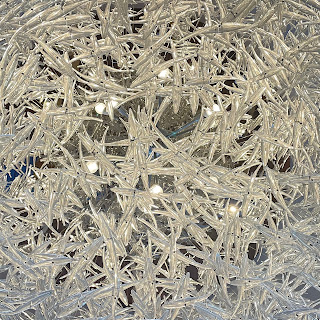I remember the wonder of discovery as I was growing up: watching insects inch along the sidewalk; clouds floating across the sky; raindrops ripple the surface of a puddle. Each encounter with the world expanded my knowledge and understanding of my surroundings.
Growing up in a family with six children provided other opportunities to learn: how to interact; how to give and take; how to share and hold onto. Formal education expanded the dimensions of what could be learned: reading, writing, math, sciences, health and safety, history and geography, and civics. Attendance, participation, and conduct seemed as important as the academic subjects.
Grades measured our progress with the goal of advancing to the next class level. Our accomplishments followed us: shaping how others thoughts of us... or how we saw ourselves.
 |
| What do you see in retrospect? (Seattle skyline) |
Throughout these stages of self-discovery and with the understanding of the world I played and worked in, I have been nagged by what I know... and don't know. Early on, as information was being poured into my brain, I sensed that there was so much more to learn. As I moved from elementary school to high school and then on to college, my confidence grew about how much I knew!
The shift from the earlier excitement of exploration to attaining knowledge was subtle: the thirst to learn was ever-present but head knowledge often overshadowed the wonder of heart and soul. Grades became the measurement; self-image became the container, shelves stacked with self-importance because of what I knew.
 |
| What do you know for certain? (Miniature library, artwork on Nieuw Amsterdam) |
Albert Einstein once said: "The more I learn, the more I realize how much I don't know." What an interesting -- and humbling -- reflection from a person regarded as exceptionally smart!
The study and practice of dialogue challenges me reclaim our childhood curiosity:
- To look and learn
- To wonder and connect
- To stand in awe at beauty and mystery
 |
| When do you see clearly? (Stephens Passage, Juneau, Alaska) |
Maybe the knowledge we have gained from family, friends, and education is not the endpoint. Rather, they are stepping stones between ignorance and knowledge and back to ignorance. The movement and rhythm of Humble Inquiry into the unknown.
Our world is vast. Peoples and cultures are complex. Our insights and understandings are limitless. I wonder if we are called not towards certainty but towards Unfolding Truth who invites us into continual discovery? I wonder if attendance, participation, and how we conduct ourselves are actually more important than the knowledge gained?
May we look beyond the portals of our understanding and seek what we don't understand. May we look beyond our head knowledge and become more open to heart knowledge and compassion. May we embrace the Ignorance of Not Knowing and invite curiosity back into our lives.
 |
| Larry Gardepie (click on link for website) |









